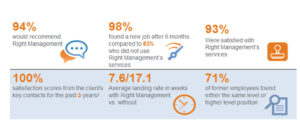It’s safe to assume that no one works their first job for the rest of their lives. People experience change, and most choose to adjust. Adjusting can be tricky – in a perfect world, no one would say goodbye or harbor bitterness. People would “get it right” the first time around and live their lives without conflict. No one would quit their job or let someone go. Reality check – we don’t live in a perfect world, and evolution produces tough situations. However, there is a mature route that can turn even the most uncomfortable separations into opportunity for all parties involved.
Be Thoughtful
Out of sight, out of mind, right? Wrong. It’s tempting to think when someone leaves your organization, they no longer affect it. That couldn’t be further from the truth. The impression an organization leaves on an employee stays with them forever, good or bad. Ex-employees tell future customers or employees about their past experiences. If they talk about hating their prior job or how they were mistreated, it’s going to influence business growth and employee retention in the future. Always be thoughtful and treat co-workers with respect. Don’t give anyone a reason to tarnish your reputation. Hopefully, they’ll do the same when they leave the company, whether it was voluntary or involuntary.
Accept that People Change
People change, and that’s okay. Most people don’t stay at the same job for the rest of their lives, and employer changes are inevitable. Fostering an environment that promotes career growth and change is critical to maintaining positive relationships with past and present employees. It can be stressful to leave a company, and making sure employees feel comfortable and supported throughout the changes in their lives help to build bridges instead of breaking them.
Revolutionize the Way you View “Goodbye”
There’s a stereotype around “goodbyes” when it comes to leaving a company. No matter the situation, it can be uncomfortable to stay in touch with a former boss or co-worker. This has to change, and it starts with the recognition that ex-employees present unique opportunities. When an employee leaves their job, do they stop advocating for their employer? Everything alumni say about their experiences affects their former company’s brand. If “goodbye” is replaced with, “how can we continue to help each other,” ex-employees operate as brand ambassadors even without receiving a paycheck.
Lifetime employment might be over, but a lifetime relationship remains the ideal. This is why an outplacement program is so critical, especially when it comes to maintaining positive relationships with ex-employees. By offering former employees the ability to safely and effectively transition from a company, employers don’t just reap the benefits of lower unemployment insurance premiums in the future or flattering coverage in the press. They create alumni networks that tell their story on social sites, in water cooler conversations and to others evaluating their former employer as a potential future employer in their career. The question isn’t whether or not alumni are telling your story. They are. The question is whether or not the story being told is building or berating your increasingly-important employment brand.
In the wise words of Patty McCord, (former chief talent officer, Netflix) “what if we created companies that were great places to be from, and everybody who leaves becomes an ambassador for not only your product, but who you are and how you operate.” Thankfully, people are turning that “what if” into “what now.” Exciting strides are being made to ensure ex-employees are viewed as alumni networks. Treat employees like they will be your future customers, business partners, connections to new talent, and brand ambassadors. When you treat them that way, even when they leave your company, that’s exactly what they will become.






Like!! Thank you for publishing this awesome article.